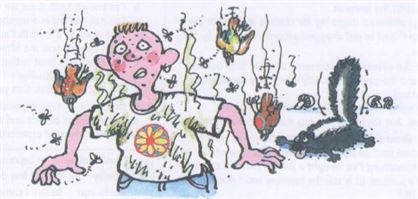Fce listening about living in a city or a village
نحوه ی پارافریز کردن در آزمون اف سی ای و بیان ترجیحات

Vocabulary 2: Paraphrasing and recording
1 If you paraphrase a sentence, you use different words to express the same meaning.
a In 1-8 below, complete each gap with one word so that the second sentence has the same meaning as the first. The second sentence is taken from the reading text on page 90. There is an example at the beginning (0). Do the exercise without looking at the reading text on page 90.

0 I start to look straight in front of me without looking at anything in particular.
I start staring into space . ( 4)
1 I can never seem to make them go away.
I can never seem to getof them. (16)
2 I work quickly to stop my suffering.
I work quickly to an end to my suffering. (27-28)
3 You can never really be certain about what you've bought.
You can never really knowcertain what you've bought. (41-42)
4 I can wear the same baggy old T-shirt for many consecutive days.
I can wear the same baggy old T-shirt for days on . (45-46)
5 Why would I make myself suffer the torture of shopping?
Why would I put myself the torture of shopping? (48-49)
6 A pair of trousers has just been delivered to me.
I have just delivery of a pair of trousers. (51-52)
7 The only thing I need to do is go to the post office.
A simple trip to the post office isthat's needed . (58-59)
8 I still get depressed when I have to buy new shoes.
My still sinks when I have to buy new shoes. (G)
b Check your answers in the reading text on page 90. The numbers in brackets refer to the lines in the text; the letter in 8 refers to the sentence G.
2 Paraphrasing is a useful way to record vocabuiary. Paraphrase the following sentences from the reading text and record both sentences in your vocabulary notebook. You do not need to change every word in the sentence. The first one has been done for you.
a ... when the conversation turns to clothes shopping .......... (2-3)
... when people start talking about clothes shopping .............. .
b ... I feel pressured into trying things on ... (18-19)
c I break into a sweat. (25-26)
d I head off in search of my size. (32)
e I'm not bothered if I look scruffy ... (B)
f The shop's fluorescent lighting is sometimes to blame for this. (E)
What to expect in the exam
Paraphrasing is relevant in all areas of the First exam.
In the Reading and Listening tasks. multiple-choice and multiple-matching questions often paraphrase what is written in the text or said in the recording.
In the Writing and Speaking papers. you should avoid repeating the same language and use a wide range of vocabulary and structures.
In Pan 4 of the Reading and Use of English paper, the transformations test your ability to paraphrase.
Listening 1
Part 4
Multiple choice 1.46

1 What are the advantages and disadvantages of living in the country and living in a city? Which would you prefer?
2 You will hear part of a radio programme in which two people, Rebecca and Greg, are interviewed about their life in the countryside. For questions 1-7, choose the best answer (A, B or C).
I suppose my priorities had changed with age. When I first went to London, I used to love the hustle and bustle of the place. But then I gradually became more aware of the planes roaring overhead, car horns beeping all the time, music blaring out at strange hours. I needed a break.
Greg, I can see you're smiling.
Yes. I remember when I first moved out with my family, we all found it a little too quiet. But we quickly got used to it, and now we prefer living with less noise. We also like the fact that you don't have to worry about the kids so much if they go off on their own.
Hmm, I'm not so sure. Some people drive like maniacs on these narrow roads. I have to keep a really close eye on my two young kids and make sure they don't wander off too far.
Well, we're lucky enough to have very good neighbours in the village. Everyone looks out for everyone else, and someone will soon tell you if your kids are in danger, or doing something they shouldn't be doing.
Yes, you can't do anything in a village without your neighbours knowing about it. But that's good, though. It's like having a big extended family.
What about the amenities where you live?
The basics are within walking distance from us; the school, the shops, even a couple of tennis courts.
I can't say the same, unfortunately.
Being able to pop out to the shops when you need something is one of the things I miss about living in the city. We have to get the car out just to go and buy a loaf of bread. And you really do need to be able to drive to live where we do. Everyone in the village relies on their car; the bus service is just too infrequent.
It's better than not having one at all. We're actually trying to get the local authorities to put on at least one bus a day, particularly for the older residents who don't have a car and who sometimes need to go into town.
Yes, and I'm actually wondering how my two are going to find it when they become teenagers. They'll want to go into town, too. They'll probably complain of boredom and want us to go and Jive in the city again.
And who can blame them? I know at that age I would have been bored out of my mind! No cinemas, no decent shops, no cafes to sit in, no discos to go to ...
Do you think either of you will ever go and live in the city again?
Naturally, I'd prefer to stay in the village and work at home rather than do a nine-to-five job in an office. I have my computer,email and the phone and a wonderful working environment. However, anything can happen and we'd be prepared to move back to London if we felt it was to our advantage.
Rebecca, how about you?
I'll be going back to work just as soon as my youngest child starts school. September of next year, in fact.Obviously I've thought about it a lot, and the fact that living where I do now will mean spending two hours driving to and from work every day. But I'd rather do that than go back to living in the city.
Well, thank you for both coming all that way to speak to us today. We'll have a break for music now and then
1 Rebecca moved out of the city to escape
2 What gives Greg less cause for concern now that he lives in the countryside?
3 Rebecca regrets the fact that
4 What does Greg say about buses where he lives?
5 How does Greg react to Rebecca's concerns that her children may grow bored?
6 What does Greg say about the future?
7 What inconvenience does Rebecca mention in relation to her return to work?
Language focus 2: Expressing preferences
1 The following sentences from the listening show three
different ways of expressing preferences.
- prefer + gerund/noun + to + gerund/noun
Now we prefer living with less noise (to living/life in a noisy city).
- would prefer + infinitive with to + rather than + infinitive without to
I'd prefer to stay in the village and work at home rather than do a nine-to-five job in an office.
- would (much) rather + infinitive without to + than + infinitive without to
I'd rather drive to work than go back to living in the city.
2 Complete the second sentence so that it has a similar meaning to the first sentence. Use up to five words.
1 We'd prefer to come back later rather than wait here.
We'd rather here.
2 I think it's better to pay by cash than use a credit card.
I prefer using a credit card
3 I'd rather phone him than send an email.
I'd prefer send an email.
4 She wants to stay in bed longer.
She'd rather up until later.
3 a Which of the following do you prefer doing and why?
- playing sport or watching it
- downloading music or buying CDs
- a pizza or having one delivered
- giving presents or receiving them
b Which of the following would you rather do if you could or had to choose? Why?
- learn another language or perfect your English
- live abroad for five years or stay in your own country
- go whitewater rafting or do a parachute jump
- do a poorly paid but stimulating job or earn a high salary doing something dull


